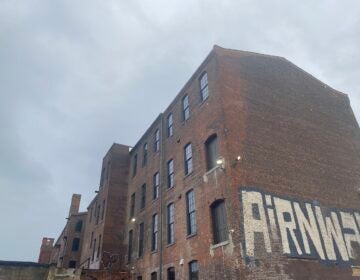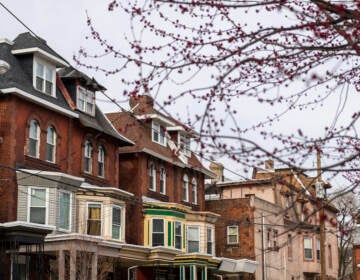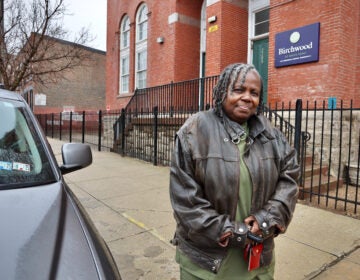Turning point: Philly developer wants to forge a legacy that transcends his past
Dawud Bey spent more than a decade in prison for drug trafficking. Now he’s building on city land and renovating properties with multimillion-dollar loans.
Listen 8:32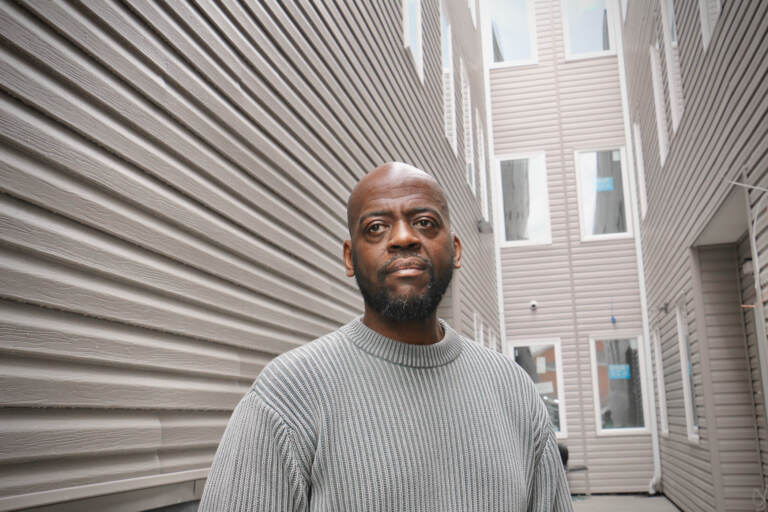
Dawud Bey stands in front of the 18-unit apartment building on North Broad Street that he built from the ground up. (Emma Lee/WHYY)
Inside a modern two-bedroom apartment on North Broad Street, developer Dawud Bey walks around with a strip of blue painter’s tape, tearing off small pieces to mark spots that haven’t been cleaned to his standards.
In the coming days, the place will be professionally photographed so that the 18-unit development, Bey’s biggest to date, can be marketed to prospective tenants.
It’s a step more than two years in the making. And he wants everything to be perfect.
“Little stuff like that,” Bey, 54, tells his daughter Shaakira after pointing out a painted-over door hinge. “But this is absolutely a good job. And everything is looking much better.”
The $3 million development is the kind of project Bey dreamed of while he was serving a federal prison sentence for drug trafficking and witness tampering. It’s also not the kind of project most formerly incarcerated people get the opportunity to realize.
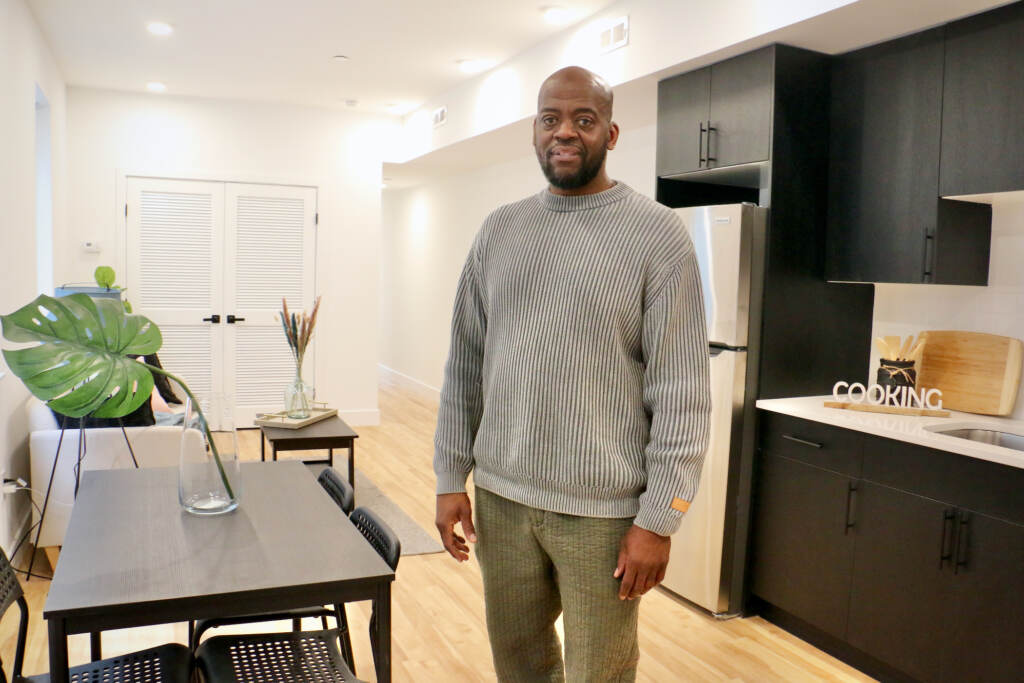
Bey knows this. It’s a big part of what drives him as a developer — showing others that street crime isn’t the only way to make a living, to earn respect and admiration.
“I want young Black men to see that young Black men can do this,” said Bey, who is Black.
“I want them to see that this is a sexy business to be in. You know, you can still get girls and be attractive and all of that. That one of the easiest ways you can get that Bentley that you see on TV is through development and real estate.”
The ‘turning point’
Bey is founder and CEO of Fine Print Construction. Under that banner, he builds market-rate developments like the one on North Broad. But the anti-violence activist also builds affordable housing projects.
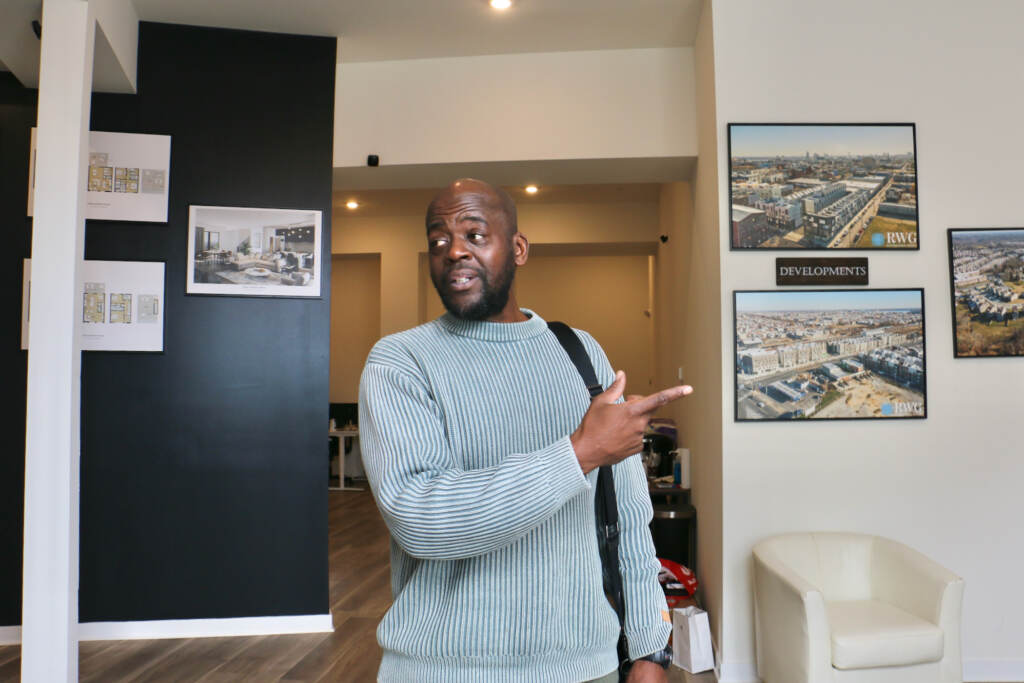
His goal is to develop more housing units than his mentor and music icon Kenny Gamble, who founded Universal Companies, a nonprofit developer and charter school operator, after stepping away from the spotlight.
He’s got a ways to go, but Bey feels like he’s on the right path.
“This is the turning point of my career,” he said.
With support from City Councilmember Kenyatta Johnson, the city recently awarded Bey more than 50 vacant lots in Grays Ferry and Point Breeze. All of the parcels, acquired through a competitive bidding process, will be transformed into workforce housing for first-time homebuyers.
Bey is also renovating a Victorian-style apartment building in Parkside through the Philadelphia Accelerator Fund, a nascent nonprofit dedicated to giving Black and brown developers real estate developers access to capital they typically have a harder time securing than their white counterparts. The $2.7 million revamp is the fund’s first and will feature a mix of market-rate and affordable units.
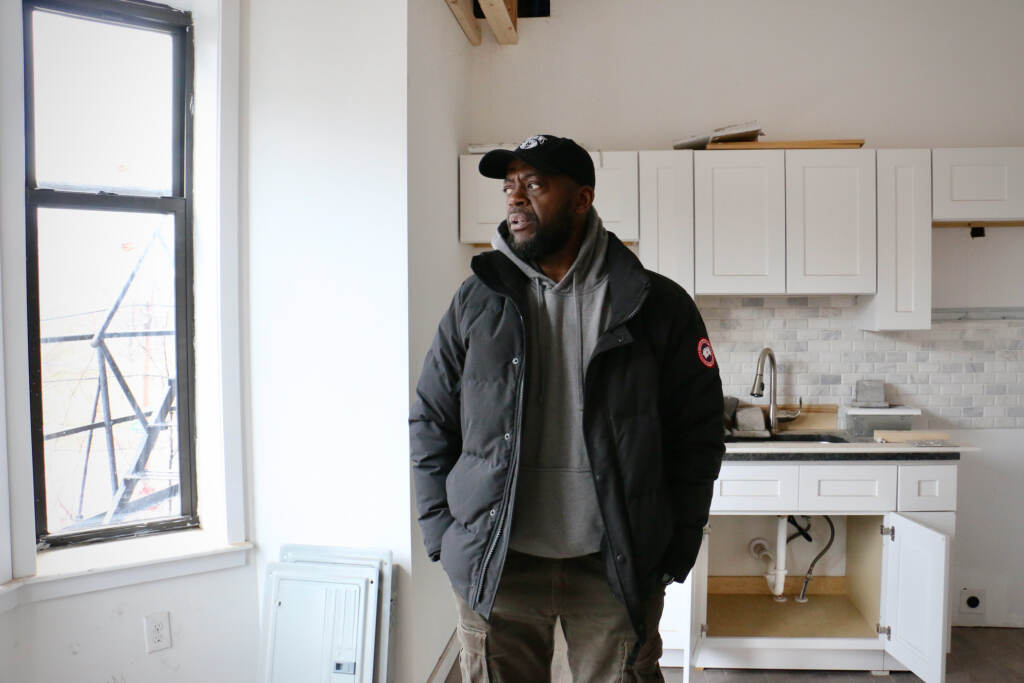
It’s expected to be Bey’s most profitable project to date. The imposing building was recently appraised at $3.6 million.
“I’m impressed with where he was when we had that first conversation and what he’s doing now. He was doing some things at the time, but not to the scale he’s doing now,” said developer and friend Jeffrey Tubbs, who met Bey four or five years ago.
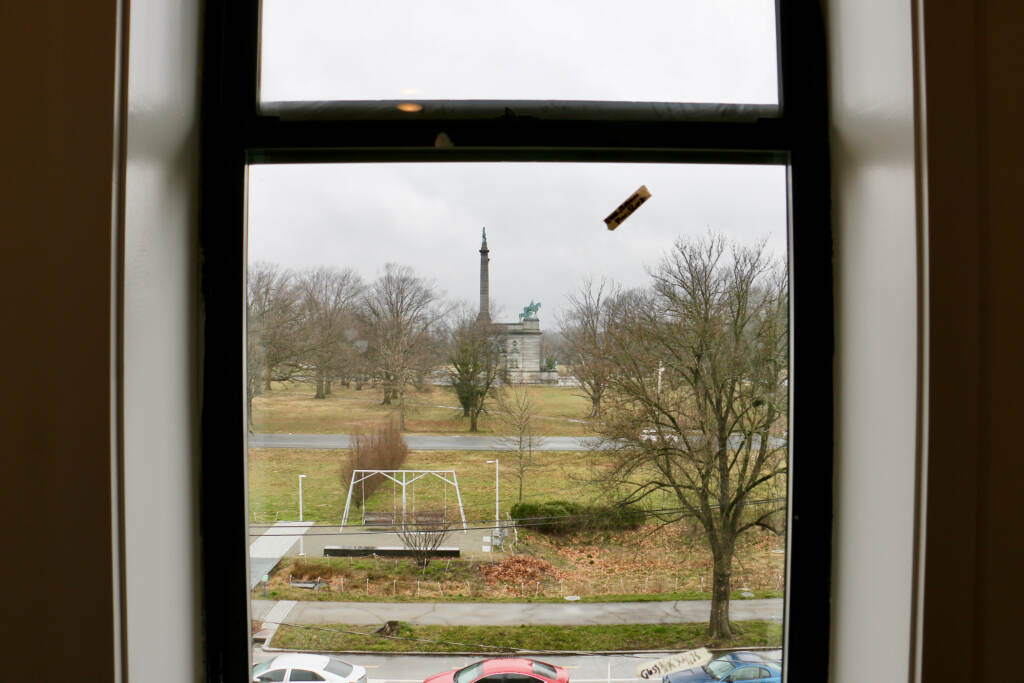
Gary Jonas, president of the Building Industry Association of Philadelphia, said people want to work with Bey — and give him bigger opportunities — because he’s genuine and has good follow-through.
“When he tells you something, he means it,” said Jonas, another one of Bey’s mentors. “People recognize that in him immediately, and that’s a unique trait.”
Bey’s success has come with some criticism.
In Grays Ferry, a group of residents and activists are upset that a cluster of vacant lots will be replaced by eight homes priced above what most longtime residents could afford. Under the city’s “Turn the Key” initiative, the properties on Myrtlewood Street will be sold for up to $230,000. The median sale price for homes in the neighborhood was $167,700, according to data from the U.S. Census Bureau.
“This is considered a low-income area. You putting expensive houses that sit up there … that raise everybody’s taxes around,” Christal Heath, who grew up near the lots. “This is why so many people are losing their houses.”
“I blame Dawud because he knows this neighborhood,” she said.

Overcoming obstacles
Bey started out as a general contractor renovating single-family homes in South Philadelphia, where he grew up. He was in his early 30s and still selling drugs, but wanted a way to earn a legitimate income and create generational wealth.
Real estate investment was his answer.
In 1994, he bought a large hair salon in Point Breeze, which helped generate clients for his contracting business andbuild connections for his investment portfolio. The same year, he bought a shell of a property at 18th and Carpenter streets in Graduate Hospital, then a predominantly Black neighborhood with little developer interest.
He paid $2,000 for it.
“I was saying, ‘Man, this is Center City. This is Center City. Nobody would believe me during that time,” said Bey during a recent interview at his office near Fishtown.
The investments would prove critical to Bey’s future, including his development career.
After refinancing the hair salon, Bey bought five depreciated rowhouses in North and South Philadelphia. But the abandoned properties were stolen, part of a ring that poached at least three dozen houses from their legal owners by filing bogus deed transfers with the city, according to the Philadelphia Daily News.
More than a dozen people were charged in connection with the scam, including Bey.
A judge later found him not guilty of conspiracy, forgery, and related charges after a nonjury trial. But Bey said the episode created debt — the $170,000 he spent on the properties plus legal fees — that remained when went to prison.
He sold the hair salon to help.
After he was released from prison in 2015, Bey was determined to start developing real estate again. But his record made it challenging for him to get the kind of financing he needed to complete the projects he wanted to pursue. He didn’t have any recent financial history to justify larger loans.
“All I ran into was hard money lenders that only wanted to give me about $100,000. I couldn’t really do nothing with that. I probably would have ended up going back to the streets with that small amount of money,” said Bey.
But he had a lifeline. He still owned the duplex he renovated in Graduate Hospital, which continued to gentrify while he was in prison and became one of the city’s hottest neighborhoods.
Bey easily sold the property for $500,000. The money helped give him the second chance he’d been preparing for while he was behind bars.
‘No alternative’
Bey grew up in poverty in Point Breeze in the 1970s, at a time when the neighborhood was gripped by a heroin epidemic.
His father belonged to the Nation of Islam. But he was also a prominent member of the Black Mafia, a violent organized crime syndicate that operated in various African American neighborhoods in North and South Philadelphia.
Later nicknamed the “Muslim Mob,” the infamous group was one of the city’s major drug traffickers during the height of its power.
Bey’s mother was also involved in criminal activity, shoplifting luxury items like fur coats and reselling them. She went to prison for it.
By the time Bey was a teenager, neither of them was around much.
He said he started selling drugs to survive.
“I can see, in hindsight, other things that I could of did as a choice. But during that time, because of the negativity that’s in the environment, you can’t see it. You can’t see the opportunities that’s around you because all you really see is death and destruction,” said Bey.
He started dealing marijuana before turning to cocaine. At the time, Philadelphia, like many big cities around the U.S., was in the throes of a crack epidemic.
Bey became, in his words, a “Big Kahuna.”
In his early 30s, Bey began doing business with Kaboni Savage, a North Philadelphia drug lord infamous for orchestrating the fatal firebombing of a cooperating witness’ family.
The relationship forever altered his life.
In 2005, Bey pleaded guilty to distributing cocaine that Savage supplied to him. Federal prosecutors had recordings of phone conversations Bey had with other associates about the notorious drug trafficking operation.
The government also had recordings of conversations that Bey had with Savage while the two were awaiting trial at the Federal Detention Center in Philadelphia. The two used the facility’s phones, and other means, to intimidate and threaten their associates and their family members, according to a 2009 indictment. The goal was to coerce them into refusing to testify in court.
Between the two cases, Bey served a total of 10 ½ years in federal prisons around the country — a stretch he called a test on his “soul and character.”
An ‘aha moment’
While he was behind bars, Bey made it his mission to learn everything he could about the development world — from financing to construction.
“I just start ordering books,” said Bey.
“Rich Dad, Poor Dad,” Robert Kiyosaki’s controversial bestseller about financial literacy and accumulating wealth; “Seven Habits of Highly Effective People,” Stephen Covey’s bestselling book about self-improvement; “The Power Broker,” Robert Caro’s Pulitzer Prize-winner about powerful New York city planner Robert Moses.
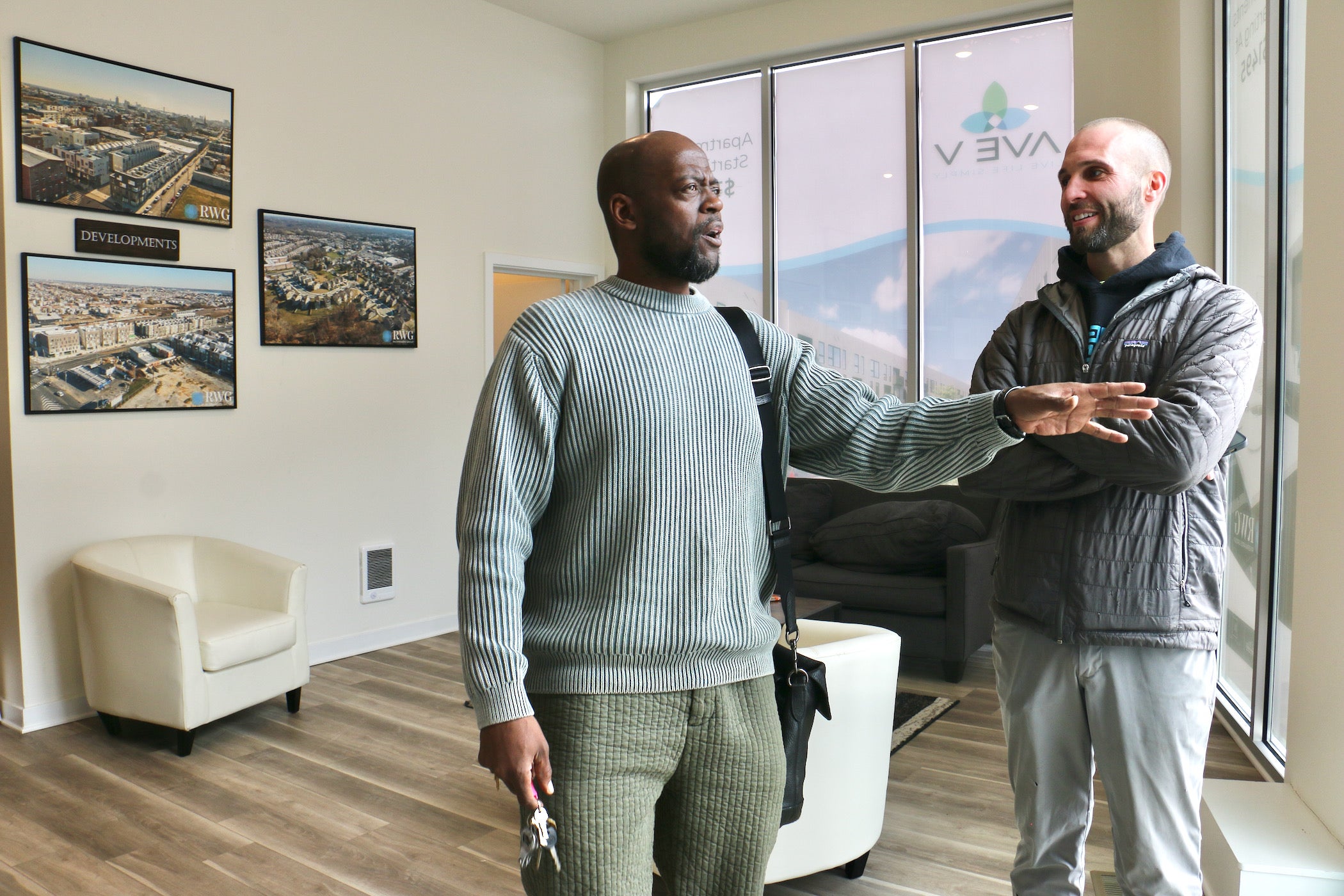
He went through the 1,300-page book three times.
But about five years into his sentence, Bey read something that stopped him in his tracks.
It was a letter from his first wife. Bey said every syllable she wrote “jumped off the page.”
“It wasn’t arrogant or belligerent. It wasn’t one of them cuss me out letters or nothing like that. It was just one of them letters that just told what the struggle was, their current conditions because of my incarceration,” he said.
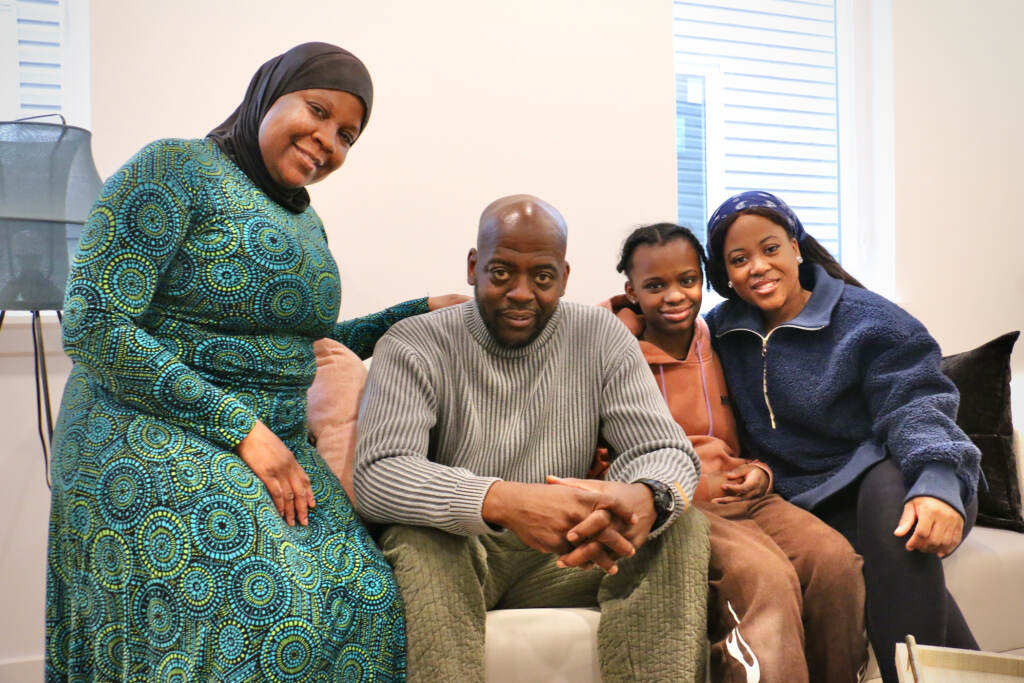
It stung, but Bey said the letter made him want to change.
Driven to do better by his family, Bey’s determination to make it as a developer — and not return to a life of crime — deepened.
When he was on probation after his release and prohibited from managing real estate, Bey spent hours researching properties while working construction for a friend’s company.
When the pandemic forced everyone indoors, Bey spent a lot of time at home building his business on paper.
Thinking about his legacy has also motivated him. He doesn’t want to be remembered as a bad guy.
“I would want the better part of what you can remember to shine most in your mind. And I believe that’s kind of like all of us,” said Bey. “We all big walking contradictions. And I’m no different than anybody else.”

Subscribe to PlanPhilly
WHYY is your source for fact-based, in-depth journalism and information. As a nonprofit organization, we rely on financial support from readers like you. Please give today.







